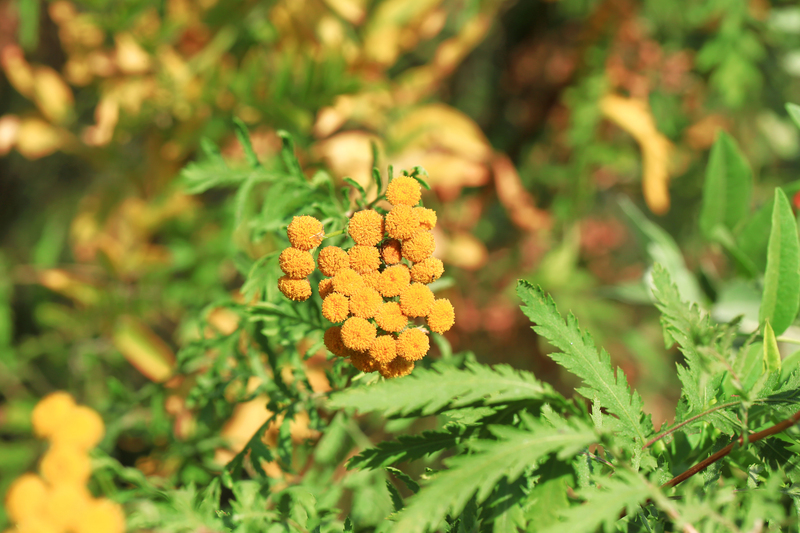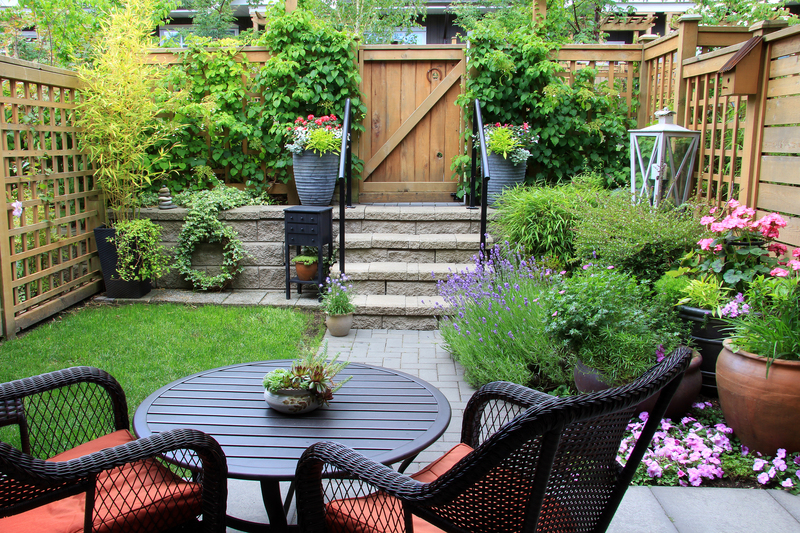The Art of Transforming Waste into Healthy Soil
Posted on 21/09/2025
The Art of Transforming Waste into Healthy Soil
Turning waste materials into nutrient-rich, healthy soil is an ancient, eco-friendly practice that remains essential in modern gardening and agriculture. By embracing sustainable techniques, we can transform organic matter that would otherwise rot in landfills into valuable compost for vibrant, thriving gardens. In this comprehensive article, we'll explore every aspect of waste-to-soil transformation, from the science of decomposition to the latest innovations in eco-conscious composting. Whether you're a gardening enthusiast or a sustainability advocate, learn to master transforming waste into healthy soil and help nourish both your plants and the planet.

Understanding Why Soil Health Matters
Healthy soil is the foundation of every robust ecosystem. It supports plant growth, promotes biodiversity, prevents erosion, and regulates water and carbon cycles. However, billions of tons of organic waste are sent to landfills each year, where they emit harmful greenhouse gases instead of enriching our soils. Through smart waste transformation, we can close the nutrient loop, revive degraded soils, and combat climate change.
Key benefits of healthy soil:
- Enhanced plant growth and yield.
- Improved water retention and reduced erosion.
- Increased biodiversity and ecological resilience.
- Natural carbon sequestration, fighting climate change.
- Less reliance on chemical fertilizers and pesticides.
The Science Behind Soil Creation
The art of transforming waste into healthy soil is rooted in natural processes. Organic matter--such as food scraps, yard trimmings, and even certain paper products--is broken down by microorganisms, fungi, and larger decomposers like worms, beetles, and insects. As these organisms digest and decompose the material, they release essential nutrients and create humus, the dark, crumbly substance that marks true soil fertility.
Decomposition stages:
- Mesophilic Phase: Moderate temperatures, dominated by bacteria breaking down simple compounds.
- Thermophilic Phase: High-heat stage that kills pathogens and weed seeds, further decomposing tougher materials with heat-loving microbes.
- Maturation/Curing: Cooler temperatures and complex organisms stabilize the compost, forming finished soil.
Best Practices for Waste Transformation
1. Choosing the Right Materials
Not all waste is suitable for the compost or soil-building process. Focus on organic, biodegradable materials that won't introduce toxins or disrupt the balance of your compost pile.
- Ideal Inputs: Fruit and vegetable scraps, coffee grounds, eggshells, grass clippings, leaves, untreated wood chips, shredded newspaper.
- Avoid: Meat, dairy, oils, diseased plants, pet waste, treated or glossy paper, plastic, metals, and synthetic chemicals.
2. Mastering the Carbon-to-Nitrogen Ratio
A successful organic transformation into healthy soil relies on the right balance of "browns" (carbon-rich materials) and "greens" (nitrogen-rich materials).
- Browns: Dry leaves, straw, cardboard, wood chips
- Greens: Grass clippings, kitchen scraps, fresh plant trimmings
The ideal carbon-to-nitrogen ratio is about 30:1. Too much carbon leads to slow decomposition, while too much nitrogen can produce foul odors and leach nutrients.
3. Proper Composting Methods
There are several methods for turning waste into healthy soil. Choose one that fits your space, needs, and lifestyle:
- Traditional Pile or Bin: Simple, scalable for gardens; requires occasional turning and monitoring.
- Tumbler Systems: Contained, pest-resistant, and easy to aerate.
- Vermicomposting: Uses worms (usually red wigglers) to rapidly convert food scraps into nutrient-rich worm castings.
- Bokashi: This anaerobic process "ferments" waste with beneficial microbes; ideal for apartment dwellers and small spaces.
Step-by-Step Guide: From Waste to Healthy Soil
Step 1: Start with the Right Bin or System
- Outdoor bins are best for larger garden spaces and yard waste.
- Indoor or balcony bins (like Bokashi or vermicomposters) work well for small-scale urban composting.
Step 2: Layer Materials
- Begin with a coarse layer (twigs, shredded cardboard) to encourage airflow.
- Add alternating layers of greens and browns to achieve the ideal nutrient balance.
- Moisten each layer slightly, but avoid saturation.
Step 3: Aeration and Maintenance
- Turn your compost pile every 1-2 weeks. Oxygen is essential for healthy decomposition!
- Monitor moisture--compost should feel like a damp sponge.
- Check temperature in the pile's center to ensure active breakdown (should be warm during peak stages).
Step 4: Harvesting the Finished Compost
- Mature compost is dark, crumbly, and earthy-smelling--similar to healthy garden soil.
- Sift out larger undecomposed pieces to return to the system.
- Apply finished compost as mulch, soil amendment, or to enrich potting mixes.
Advanced Techniques for Transforming Waste Into Soil
Hot Composting for Rapid Results
Hot composting speeds up decomposition by maintaining high internal temperatures. Achieve this by creating large, well-balanced piles (at least one cubic meter), turning them frequently, and keeping moisture consistent. This allows you to convert waste into fertile soil in as little as 4-8 weeks!
Sheet Mulching (Lasagna Gardening)
Sheet mulching involves layering organic waste directly onto the soil, mimicking natural forest floor processes. Start with cardboard, then add alternating "green" and "brown" layers. Over time, this technique transforms waste in place, suppresses weeds, and builds rich, healthy soil.
Vermicomposting: Harnessing Worm Power
Red wiggler worms (Eisenia fetida) are champions of waste-to-soil conversion. In specialized bins, they rapidly consume kitchen scraps, producing worm castings prized for their microbial diversity and plant-growth benefits.
- Great for indoor composting or small spaces.
- Finished worm compost makes an excellent seed starter or fertilizer tea.
Common Challenges (And How to Solve Them)
- Bad Odors: Usually caused by excess nitrogen or poor aeration. Add browns and turn the pile.
- Pests: Keep meat, oils, and dairy out. Use closed bins or tumblers for added protection.
- Slow Decomposition: Chop materials smaller, increase nitrogen, and boost aeration.
- Soggy Pile: Mix in dry browns and adjust watering habits.
The Environmental Impact of Recycling Organic Waste
Transforming waste into healthy soil isn't just good for your garden--it's essential for the environment. Consider these sustainable benefits:
- Landfill Waste Reduction: Composting diverts up to 30% of household waste away from landfills.
- Carbon Footprint Reduction: Healthy soils store carbon; composting prevents methane emissions.
- Supports the Circular Economy: Waste becomes a resource, creating a regenerative system.
Practical Applications: How to Use Recycled Soil
Your homemade compost and healthy soil can enrich nearly every facet of plant care and food production.
- Soil Amendment: Mix into planting beds or garden rows to boost fertility and improve structure.
- Mulch: Apply a layer on top of soil to retain moisture, regulate temperature, and suppress weeds.
- Potting Mix Booster: Blend with store-bought or homemade potting soils for container gardening.
- Top Dressing: Sprinkle around established plants for a slow-release nutrient boost.
- Tea Production: Steep in water to make "compost tea", an excellent liquid fertilizer.
Innovations in Turning Waste into Fertile Soil
Community Composting Initiatives
Many cities now offer drop-off or curbside composting programs, making it easier to keep organics out of the waste stream. Community gardens and local farms also benefit from donated compostables.
Home Composting Technology
Modern sensors and aeration systems allow for "smart composting," automatically adjusting moisture and airflow to speed up decomposition and eliminate guesswork.
Biochar and Soil Regeneration
Biochar--a carbon-rich material created by burning organics in low-oxygen environments--can be mixed into compost to boost soil fertility, water retention, and carbon sequestration.

Getting Started: Easy Steps for Every Household
Whether you have a sprawling yard or a modest apartment balcony, it's easy to join the movement of transforming waste into healthy soil:
- Collect food scraps and suitable organics daily.
- Set up a compost bin or connect with a local drop-off program.
- Learn, experiment, and share your soil-building journey!
- Inspire others by demonstrating your thriving plants and reduced trash.
Each handful of compost produced is a step toward a healthier planet and more productive gardens.
Conclusion: Cultivating Tomorrow, Today
The art of transforming waste into healthy soil is both ancient and innovative, blending science with sustainability. By closing the loop--returning food and yard scraps to the earth--we nurture soils, secure food supplies, and fight climate change. Now is the time to rekindle this art, turning every scrap into a seed for a greener future.
Are you ready to become a soil steward? Start today by composting your kitchen waste, educating neighbors, and supporting community compost efforts. Together, we can transform waste into a flourishing, healthy world beneath our feet.
Latest Posts
The Art of Transforming Waste into Healthy Soil
Get started with your own container garden today
Gain Confidence with These 9 Foundations of Gardening
How to Turn Your Outdoor Space into a Child-Friendly Oasis
Transform Your Garden with Hedge Trimming Shapes and Techniques



